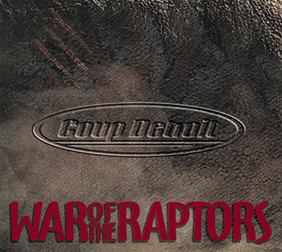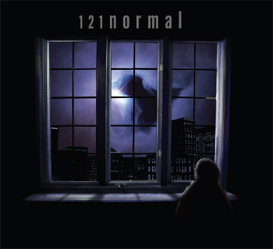Artists CDs and performance DVDs
Glenn Poorman
|
121 Normal - 121 Normal 2007 CD $15.
SAMPLE MP3s from 121 NormalProphesy and politics aside, Poorman shares an appreciation for tasteful repetition and intelligent automation, a knack for good grooves and memorable melodies, a progressive approach to otherwise pop sensibilities, and a compass for collective destination not quite reachable with only one pilot. Whereas Parsons favored male vocals and glassy 12-string dreadnaughts, Poorman goes for the girls, 12-string Grand Stick, and 10-string Alto. Both artists make fervent use of howling electric guitars and light-stepping electronic drum sequences.Poorman's judicious orchestrations are a clean canvas for his focused Stick tones and nimble tapping. In all, the album carries a polished celestial glow from start to finish. Everything is in its place and time, and Poorman has captured the sounds of his Sticks with fine precision. 121normal opens with the familiar "Frantic in Nature," which in solo variation has been one of Poorman's live staples. This fully orchestrated rendition encompasses much of what's to come, with its swirly, phase-shifted, ever panning Stick loops and staccato arpeggios. "Sunday in Salt Spring" slows the frenetic momentum and introduces the next common thread throughout this work: irresistibly sweet melodies that cascade one over another, always reminding us of a world that's gorgeous despite its troubles. With remarkable clarity in the Grand Stick's upper registers, Poorman achieves a dulcimer-like pling that chimes over a looped pedal tone and creates a sweet interplay with acoustic piano. The third track, "Lookin Good at Eight," gets funky and brings on the album's next major character, the prerecorded radio voice. A random-sounding but no doubt well-calculated ostinato bounces through lunar wind, bleeps and bloops, and more pyramids of layered Sticks. "Remember When" seems to pay tribute to some likely Poorman influences: the watery Patch of Shades-era lead work of Emmett Chapman himself, the mellotron pads of King Crimson, and some sizzling solos that sound more like the fleet-fingered prowess of Joe Satriani than the woody soul tones of Parsons' Ian Bairnson. Up next is a dreamily tapped Alto Stick showcase, "A Thousand Words." Then "London Trains" arrives from a familiar place, recapping elements of "Frantic" but with the added vocals of Mary Kay Blitz. Fittingly, its softly ricocheting drum patterns and silky smooth keyboards deliver a British-sounding urban slickness. It's a classy buildup to the floating and beautifully restrained "Langmuir," a short Enoesque cycle that serves as a midalbum intermission of sorts. After the break, we hear the Alto Stick again in "Hard Times," with a cheerful and lilting Stick groove and a chirpy, almost bagpipe-sounding counterpoint. "To Walk in Time" also features the Alto and brings back the female vocals, this time those of Julie Marcos, and showcases hot electric guitar leads in contrast to the song's cool, lolling, kick-it-over groove. By now it's clear what 121normal is, at least in part, all about: marrying the Stick's historically prog rock roles with its versatile applications in the pop-rock-folk-world-fusion mixes. This makes the CD very accessible throughout, and it's bound to appeal to a wide audience. You're almost guaranteed to come away from 121normal with any one (and probably more) of its many hooks, beats, riffs, and melodies lingering in your mind. The role of Greg Howard as co-producer, mixer, and mastering engineer is evident at every turn of these tunes, not unlike Parsons' behind-the-scenes fingerprints on Dark Side of the Moon. Howard has meticulously mixed these songs to capture the depth of Poorman's textures and to bring out the subtleties of, especially, the full-range Stick timbres. By now, Stickists have come to know Poorman well through his broad involvement in the community, from his live performances and seminar organization to his various online roles in furthering the instrument. His debut Stick-centered release has been a long time coming, and indeed it proves a logical, exciting, and fitting culmination of all those efforts. John Edmonds is a Stick player, composer and singer-songwriter based in New Mexico. His latest release is entitled Burn Down the Sun. You can find out more about his music at: https://johnedmonds.net/. |
|
Coup Detroit - War of the Raptors2006 CD $15. Review by Greg Howard
Review by Greg HowardStraightforward catchy hard rock, with some subtle funk and progressive rock overtones. This tight Detroit-area quartet features vocalist Julie Marcos, guitarist/vocalist Dan Holmes, drummer John Turnage and Glenn Poorman on Stick, bass and vocals. The lyrics are edgy and full of irony, and Marcos's delivery is honest and powerful. Most of these 12 tracks are short variations on the familiar pop song form, with some under 3:00, and Coup Detroit manages to slip in a few surprising twists and turns along the way. From very natural feeling odd times, 9/8 on "Beware" and 7/8 on "Teacher" and "Life is Grand" to some dramatic interludes and perfect bridges. There are some nice intertwined Stick melody and guitar parts, and Poorman's Stick bass parts have that unmistakable extra growl that distinguish them from the bass as he solidly holds down the bottom end as well. He's got a great hookup with Turnage's intense drumming and Holmes's aggressive guitar work, and the three players are clearly equal partners in creating these dramatic arrangements. SAMPLE MP3s from War of the RaptorsAs a document of the band's energetic live sound, War of the Raptors does the job well. And while not a "Stick-feature" CD it's nice to hear a tight rock band where substantial roles for the instrument are solidly performed. More records and bands like this one can only prove how much the Stick has come into its own as a rock instrument, on par with the bass, drums and guitar. |

 Review by John Edmonds
Review by John Edmonds